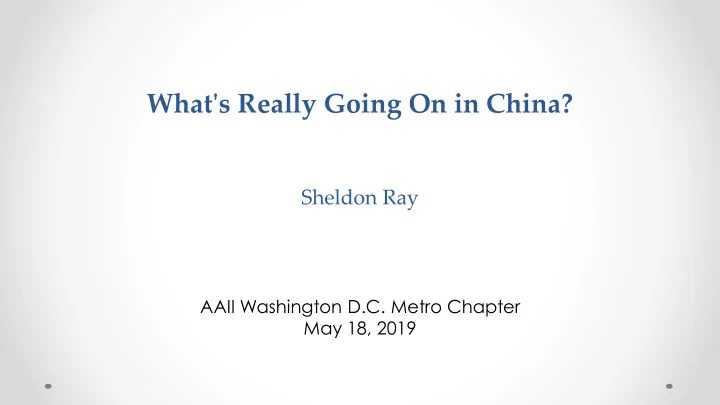

What's Really Going On in China? Sheldon Ray AAII Washington D.C. Metro Chapter May 18, 2019
Today’s Agenda • Provide an overview of China's economy, political landscape, US relations, markets, risks, security issues, Hong Kong relations, trade, and its military. • Discuss the implications for investments as China further develops
China's economy may be in better shape than you think. • China's economy is no longer as dependent on exports as before. 75% of GDP growth now comes from the service industry. According to key China economists (Nick Lardy, David Dollar, Jon Anderson, etc.) China's GDP data is more reliable than many think. • Much of it can be verified from external sources, e.g., iron imports used in steel production. China's imports grew 15% in 2018, hardly a sign of an economy that is slowing down as much as markets think.
What is China's One Belt, One Road initiative? • This is a massive multi-hundred billion-dollar initiative to connect China across sea and land through Central Asia to Europe and beyond to spur long-term trade growth. The record so far is spotty, with some countries (e.g., Sri Lanka) ending up on the short end of the stick, and others benefiting.
.
What/Who is a reliable source for China insights? • There are many reliable economists, think tank experts and journalists who have pretty unbiased opinions on various aspects of China. Let’s go through a list of those I personally deem to be reliable, and many I don't.
Let’s separate fact from fiction • China is not paying US imposed import tariffs - Americans are. • Hong Kong is an autonomous part of China that has more freedoms than most Americans realize (according to senior US govt. officials, as well as senior Hong Kong govt. officials)
Let’s get a better understanding of why Beijing makes certain decisions • Many of Beijing's decisions are based on pragmatic, economic reasons vs. ideological reasons (i.e., Hong Kong's Article 23 controversy in 2003)
Let’s discuss the interdependence between the US and Chinese economies • The 2 economies are inextricably linked, and impossible to unwind (e.g., Apple I-phone components from around the world w/ final assembly in China is counted as a Chinese import by US Customs). • There is, however, much talk about a future bifurcated technology environment in which markets may be forced to choose between US and China standards.
Additional points • Hong Kong's financial security regulations are far superior to the Mainland's and even stricter than some US rules (e.g., Alibaba's listing was turned down in Hong Kong, so it listed in the US due to more lenient rules on ownership structure) • Hong Kong and Shanghai's mutual recognition rules have improved for Hong Kong and Mainland investors over the last 4-5 years.
Additional points • China is indeed taking a harder line internally in many areas, with camera surveillance/facial recognition nearly ubiquitous. • China's US relationship has improved for many years in most areas, but has become more difficult in the last 2 years according to senior officials on both sides.
Additional points • China's military has improved capabilities quite a bit this century, but remains far behind the US so far, in expenditures as well as capabilities. • Recent events (and by recent, I mean this week!)
Not Quite There on The Handshake… Questions?
Recommend
More recommend